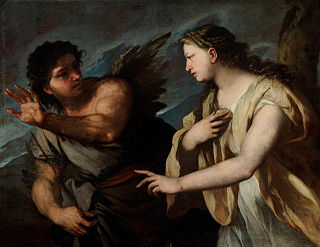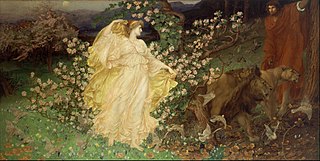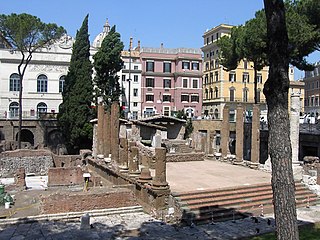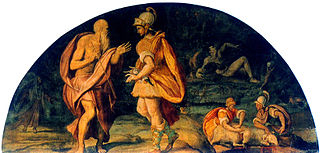
In Greco-Roman mythology, Aeneas was a Trojan hero, the son of the Trojan prince Anchises and the Greek goddess Aphrodite. His father was a first cousin of King Priam of Troy, making Aeneas a second cousin to Priam's children. He is a minor character in Greek mythology and is mentioned in Homer's Iliad. Aeneas receives full treatment in Roman mythology, most extensively in Virgil's Aeneid, where he is cast as an ancestor of Romulus and Remus. He became the first true hero of Rome. Snorri Sturluson identifies him with the Norse god Víðarr of the Æsir.

In Roman mythology, Romulus and Remus are twin brothers whose story tells of the events that led to the founding of the city of Rome and the Roman Kingdom by Romulus, following his fratricide of Remus. The image of a she-wolf suckling the twins in their infancy has been a symbol of the city of Rome and the ancient Romans since at least the 3rd century BC. Although the tale takes place before the founding of Rome around 750 BC, the earliest known written account of the myth is from the late 3rd century BC. Possible historical bases for the story, and interpretations of its local variants, are subjects of ongoing debate.

Tisiphone, or Tilphousia, was one of the three Erinyes or Furies. Her sisters were Alecto and Megaera. She and her sisters punished crimes of murder: parricide, fratricide and homicide.
In Greek mythology, Cebren was a Greek river-god, whose river was located near Troy. He was the son of Oceanus and Tethys and he was the father of Asterope and Hesperia, who are sometimes considered to be the same person, and Oenone. The city Cebrene was named for Cebren.

Picus was a figure in Roman mythology, the first king of Latium. He was the son of Saturn, also known as Stercutus. He was the founder of the first Latin tribe and settlement, Laurentum, located a few miles to the Southeast of the site of the later city of Rome. He was known for his skill at augury and horsemanship.

The Metamorphoses is a Latin narrative poem from 8 CE by the Roman poet Ovid. It is considered his magnum opus. The poem chronicles the history of the world from its creation to the deification of Julius Caesar in a mythico-historical framework comprising over 250 myths, 15 books, and 11,995 lines.

In Greek and Roman mythology, Anchises was a member of the royal family of Troy. He was said to have been the son of King Capys of Dardania and Themiste, daughter of Ilus, who was son of Tros. He is most famous as the father of Aeneas and for his treatment in Virgil's Aeneid. Anchises' brother was Acoetes, father of the priest Laocoön.
In classical Latin, the epithet Indiges, singular in form, is applied to Sol and to Jupiter of Lavinium, later identified with Aeneas. One theory holds that it means the "speaker within", and stems from before the recognition of divine persons. Another, which the Oxford Classical Dictionary holds more likely, is that it means "invoked" in the sense of "pointing at", as in the related word indigitamenta.
In Roman mythology, the Aeneads were the friends, family and companions of Aeneas, with whom they fled from Troy after the Trojan War. Aenides was another patronymic from Aeneas, which is applied by Gaius Valerius Flaccus to the inhabitants of Cyzicus, whose town was believed to have been founded by Cyzicus, the son of Aeneas and Aenete. Similarly, Aeneades was a patronymic from Aeneas, and applied as a surname to those who were believed to have been descended from him, such as Ascanius, Augustus, and the Romans in general.

RheaSilvia, also known as Ilia, was the mythical mother of the twins Romulus and Remus, who founded the city of Rome. This event was portrayed numerous times in Roman art. Her story is told in the first book of Ab Urbe Condita Libri of Livy and in Cassius Dio's Roman History. The Legend of Rhea Silvia recounts how she was raped by Mars while she was a Vestal Virgin, resulting in the twins, as mentioned in the Aeneid and the works of Ovid.

Anna Perenna was an old Roman deity of the circle or "ring" of the year, as indicated by the name.

In Roman mythology, Caieta was the wet-nurse of Aeneas. The Roman poet Vergil locates her grave on the bay at Gaeta, to which she also gives her name. The poet Ovid, working a generation later, provides an epitaph:

In the myth and religion of ancient Rome, Juturna, or Diuturna, was a goddess of fountains, wells and springs, and the mother of Fontus by Janus.

In Roman mythology, Vertumnus is the god of seasons, change and plant growth, as well as gardens and fruit trees. He could change his form at will; using this power, according to Ovid's Metamorphoses (xiv), he tricked Pomona into talking to him by disguising himself as an old woman and gaining entry to her orchard, then using a narrative warning of the dangers of rejecting a suitor to seduce her. The tale of Vertumnus and Pomona has been called "the first exclusively Latin tale."
Ferālia was an ancient Roman public festival celebrating the Manes which fell on 21 February as recorded by Ovid in Book II of his Fasti. This day marked the end of Parentalia, a nine-day festival honoring the dead ancestors.

A katabasis or catabasis is a journey to the underworld. Its original sense is usually associated with Greek mythology and Classical mythology more broadly, where the protagonist visits the Greek underworld, also known as Hades. The term is also used in a broad sense of any journey to the realm of the dead in other mythological and religious traditions. A katabasis is similar to a nekyia or necromancy, where one experiences a vision of the underworld or its inhabitants; a nekyia does not generally involve a physical visit, however. One of the most famous examples is that of Odysseus, who performs something on the border of a nekyia and a katabasis in book 11 of the Odyssey; he visits the border of the realms before calling the dead to him using a blood rite, with it being disputed whether he was at the highest realm of the underworld or the lowest edge of the living world where he performed this.
According to the Roman historian Livy, Jupiter Indiges is the name given to the deified hero Aeneas. In some versions of his story, he is raised up to become a god after his death by Numicus, a local deity of the river of the same name, at the request of Aeneas' mother Venus. The title Pater Indiges or simply Indiges is also used.

The Fasti, sometimes translated as The Book of Days or On the Roman Calendar, is a six-book Latin poem written by the Roman poet Ovid and published in AD 8. Ovid is believed to have left the Fasti incomplete when he was exiled to Tomis by the emperor Augustus in 8 AD. Written in elegiac couplets and drawing on conventions of Greek and Latin didactic poetry, the Fasti is structured as a series of eye-witness reports and interviews by the first-person vates with Roman deities, who explain the origins of Roman holidays and associated customs—often with multiple aetiologies. The poem is a significant, and in some cases unique, source of fact in studies of religion in ancient Rome; and the influential anthropologist and ritualist J.G. Frazer translated and annotated the work for the Loeb Classical Library series. Each book covers one month, January through June, of the Roman calendar, and was written several years after Julius Caesar replaced the old system of Roman time-keeping with what would come to be known as the Julian calendar.
Iarbas was a Roman mythological character, who has appeared in works by various authors including Ovid and Virgil. The character is possibly based on a historical king of Numidia.

In Greek mythology, Ascalaphus was the son of Acheron and Orphne.














